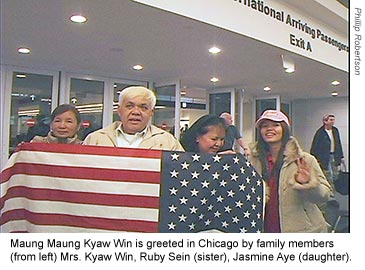New York, March 16, 2007—Fleeing death threats, Burmese journalist Maung Maung Kyaw Win, 58, and his family arrived this week in the United States with assistance from the Committee to Protect Journalists and other colleagues.
“Even though I am really happy to be here, the media is still being held hostage and the military junta continues to sow disunity in my country,” Maung Maung Kyaw Win told CPJ shortly after he arrived in Chicago, where his sister lives.
Maung Maung Kyaw Win was a senior reporter and editor at Burmese language economics magazine Myanmar Dana when he was detained by armed security agents at a restaurant in December 2005. They questioned him about a meeting he had arranged between U.S. correspondent Philip Robertson, who was reporting for Salon.com at the time, and a Burmese political dissident recently released from prison.
The agents said they had been monitoring the journalist’s movements and, brandishing a handgun, threatened “to make my wife a widow if I didn’t stop my activities,” Maung Maung said. He fled across the border to Thailand later in December, where he waited for his wife and daughter to arrive 10 weeks later. The family eventually wound up in Cambodia, where they were given refugee status by the United Nations High Commissioner for Refugees.
“We are relieved that Maung Maung Kyaw Win and his family have found sanctuary in the United States,” said CPJ Executive Director Joel Simon. “The fact that he had to flee abroad like so many other Burmese journalists is a stinging indictment of the military authorities who have systematically violated press freedom.”
Maung Maung Kyaw Win was a prominent member of the domestic press corps and served as a source of information for exile-run publications. The Burmese-language Guardian newspaper he edited was closed down by authorities after the bloody crackdown on democracy demonstrators in 1988. In the early 1990s, he helped translate into Burmese the popular book by Bertil Lintner, Outrage: Burma’s Struggle for Democracy, which chronicled the crackdown on the popular uprising. In January he received a Hellman/Hammett grant for politically persecuted writers.
